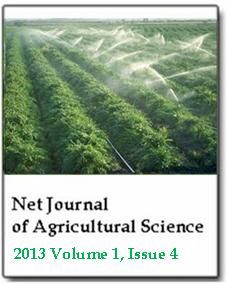Age of seedling at transplanting influenced growth and fruit yield of sweet pepper (Capsicum annum L. cv. Rodo)
H. M. Ibrahim, F. O. Olasantan and R. O. OyewaleNet Journal of Agricultural Science
Published: October 14 2013
Volume 1, Issue 4
Pages 107-110
Abstract
Field experiment was conducted at the teaching and research farm of the University of Agriculture, Abeokuta to evaluate the effect of variations in the age of nursery seedlings on growth and fruit yield of sweet pepper. The seedlings were transplanted at different ages viz. 8, 10, 12 or 14 weeks after nursery sowing (WAS). The seedlings were arranged according to their respective ages in a randomized complete block design (RCBD) with three replicates. Result of the experiment showed that the variation in the ages of the sweet pepper seedlings had significant (p < 0.05) effect on the subsequent plant height, leaf area, number of leaves and number of branches per plant. Pepper seedlings transplanted at 8 and 10 WAS produced larger leaves, greater number of leaves, more branches per plant, and also grew taller than the seedlings transplanted at 12 or 14 WAS. Variation in the seedling-transplanting age had no statistical significant difference on the fresh fruit yield (kg/ha). However, pepper seedlings transplanted at 8 and 10 weeks produced more fruits and higher fresh fruit yield per hectare than those seedlings transplanted at 12 and 14 WAS. Similarly, pepper seedlings transplanted at 12 and 14 WAS reached 50% flowering earlier than those transplanted at 8 and 10 WAS, thus gave better growth vigor and fresh fruit yield. It is recommended that pepper seedlings should not be left beyond 10 weeks in nursery before transplanting for optimum performance.
Keywords: Sweet pepper, nursery seedlings, transplanting age, fruit yield.
Full Text PDF
